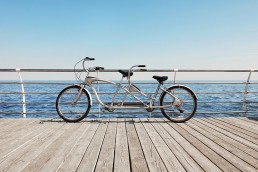Coworking and Startups: Inseparable!
“It is becoming intellectually more and more challenging to found a company…”, says a quote from founding member Oliver Kern of Papa Fuego GmbH, a food startup from Braunschweig. In fact, the number of founders in Germany has been falling for years. Since the beginning of the statistical surveys of the KfW Start-up Monitor in 2004, never before have so few companies been founded as in 20181.
This particularly affects start-ups with a low degree of innovation, i.e. those based on an established business model. The situation is different with innovative, mostly digital business start-ups. In some cases, double-digit growth rates (proportionate to all business start-ups) can be recorded here2. The quotation of our founder is not only understandable from the point of view of statistics: The good labour market offers many opportunities, the opportunity costs to found a company are high. The number of start-ups, i.e. people who found a business for lack of other alternatives, continues to fall. Thus, it is mainly knowledge-based start-ups who are left proportionately to take the risk voluntarily. They can face up to the increasing challenges of setting up a company. The quality of start-ups, if you want to call it that, is increasing, which seems to be necessary.
In addition to a good idea and motivation, founders also need good (spatial) conditions. In Germany there are so-called start-up hotspots, especially in cities such as Berlin, Munich or Hamburg, which have relatively high start-up start-up rates3. This has different reasons and is not only due to the cities themselves, since there are now also good examples of “start-up hotspots” in smaller cities such as Paderborn (e.g. http://garage33.de/). Over the last few years, (micro-) infrastructures have been built up which offer business start-ups help and support that cannot be more direct and thus make the implementation of the start-up plan into a real start-up much easier: so-called incubators4 and accelerators5 with, very importantly, integrated coworking spaces. Why are these combined structures so conducive to business start-ups?
Founders/inside and/or particularly founder teams need durably and constantly direct assistance by Mentors/inside, other Startups and self-employed persons/inside. This direct help must be immediately available. This direct mutual support does not only have professional advantages. Exactly in the phases of company development, where the dropout rates are particularly high due to a lack of visible success despite pronounced efforts, emotional help is also needed: successful founders surround themselves with successful founders. The positive “staining effect” 6 has been scientifically described and investigated several times. And here Coworking Spaces come into play: With their open, common and often also creatively inspiring organization they offer best conditions for this. However, the positive “staining effect” is not only interesting for business start-ups. It has a positive effect on all companies. This has also been recognised by many large companies, which are increasingly granting their employees access to coworking spaces as an alternative to their own offices (or are themselves transforming their offices into coworking spaces). Pleasant side effect: In addition to a potential increase in job satisfaction and attractiveness as an employer, the costs for one’s own infrastructure decrease. This pays off in several ways. Particularly impressive examples of these spatial combinations can also be found in our European neighbors.
1. station: Paris: station F
In October 2018, I visited Station F, the largest entrepreneurship campus in the world according to my own information, in Paris. On about 34,000 m2 about 1,000 startups or 3,000 “residents” work together – each for himself, but still altogether. The names of the resident incubators4 and accelerators5 read like the Who is Who of the global corporations: Facebook, Google, L´Oreal, etc. There is no coworking for the public in this sense. Who wants to get involved in this impressive place of the startup scene has to apply. At the end of the day, 1,000 successful out of approx. 11,000 applications per year remain. The Station F can be described simply with one word: Gigantic! If you want to visit Station F, you have to register for a tour. The Station F is divided into many areas: Maker spaces, presentation stages, offices, conference rooms, creative spaces… Everything is available and on a huge scale. The spatial equipment was therefore based on the same principle as a coworking space, but much larger. The long underestimated Paris is visibly catching up.
2. station: Amsterdam, the maybe still underestimated Tech-Startup-Giant
But also in other countries around the world something is happening: In November 2018 the European Coworking-Conference took place in Amsterdam. More than 550 participants from all over the world met to discuss the latest developments in the coworking world. The venue was Startup-Haus B. Amsterdam. A former IBM building complex, 4 floors, 25.000 m2 office space – not really “citynah”. A chance for coworking in the country? What struck me particularly here as well: The global dimension of coworking is getting bigger and bigger and is increasingly becoming itself an innovative and lucrative business branch. Alone wework, the largest coworking provider in the world (if you are so free and wework and other large providers to coworking, what we want to do here) already has 554 locations in 97 cities worldwide10, a gigantic global network (Further examples of meanwhile large coworking chains: Tribes, Spaces, Rent24 etc.). What do we learn from this? Coworking is not a trend, it´s a shift!
3. station: London as European Startup Mecca
Last but not least, a trip to London for a European tour was added in December. The agenda included a visit to the Telefónica Accelerator Wayra. Around 40 startups were in the Air Street building at the time of the visit. The rooms were organized like coworking rooms, which was to be expected. Then we went to the Design Museum, where there were once again beautiful examples of how important it is to look at a product from (all) sides – the consumer, the designer and the manufacturer. London offers start-ups the best conditions to start: 20 pounds and an online registration is needed to start a business in one day. The competition is fierce and tough, rents are expensive, but there is also a lot on offer for start-ups. The world’s largest coworking space provider alone wework, as we already mentioned, only has 42 locations in London. Does anyone still doubt the increasing importance of coworking?
All in all, you can hold on: Founders need support, precisely because reasons are becoming more and more intellectually demanding and complex, and this is best achieved in the environment of a coworking space such as OFFICE & FRIENDS, newly emerging spaces such as in the small town of Seesen, etc.. Therefore, this microcosm, whether in the city or in the country, is an accelerator of good ideas, business models and business start-ups.
1 KfW Start-up Monitor 2018, p. 1
2 KfW Start-up Monitor 2018, p. 3
3 KfW Start-up Monitor 2018, p. 5
4 Incubators are “breeding grounds” for start-ups (free definition)
5 Accelerators (“accelerators”) are “advanced” incubators: they take care of start-ups that are already further in development and promote their growth.
6 Fritsch, Entrepreneurship, p.188
Photo: NewAfrika

TO PERSON:
Tim Nieländer, MBA. is a research assistant at the joint chair of Entrepreneurship (Entrepreneurship Hub) at Ostfalia University of Applied Sciences and Braunschweig University of Technology. His research focuses on regional entrepreneurship and coworking. From October to December 2018 he visited the startup ecosystems of Paris, Amsterdam and London. E-mail: ti.nielaender@ostfalia.de.

